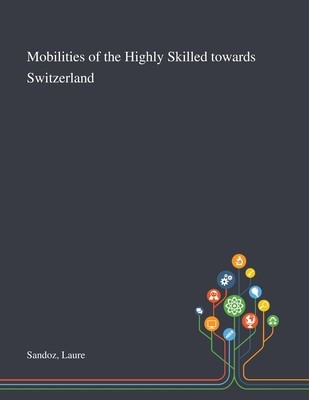
- We will send in 10–14 business days.
- Author: Laure Sandoz
- Publisher: Saint Philip Street Press
- ISBN-10: 1013272188
- ISBN-13: 9781013272189
- Format: 21.6 x 27.9 x 1.4 cm, softcover
- Language: English
- SAVE -10% with code: EXTRA
Mobilities of the Highly Skilled Towards Switzerland (e-book) (used book) | bookbook.eu
Reviews
Description
This open access book analyses the strategies of migration intermediaries from the public and private sectors in Switzerland to select, attract, and retain highly skilled migrants who represent value to them. It reveals how state and economic actors define "wanted immigrants" and provide them with privileged access to the Swiss territory and labour market. The analysis draws on an ethnographic study conducted in the French-speaking Lake Geneva area and the German-speaking northwestern region of Switzerland between 2014 and 2018. It shows how institutional actors influence which resources are available to different groups of newcomers by defining and dividing migrants according to constructed social categories that correlate with specific status and privileges. This research thus shifts the focus from an approach that takes the category of highly skilled migrant for granted to one that regards context as crucial for structuring migrants' characteristics, trajectories, and experiences. Beyond consideration of professional qualifications, the ways decision-makers perceive candidates and shape their resource environments are crucial for constructing them as skilled or unskilled, wanted or unwanted, welcome or unwelcome.
This work was published by Saint Philip Street Press pursuant to a Creative Commons license permitting commercial use. All rights not granted by the work's license are retained by the author or authors.EXTRA 10 % discount with code: EXTRA
The promotion ends in 16d.03:30:55
The discount code is valid when purchasing from 10 €. Discounts do not stack.
- Author: Laure Sandoz
- Publisher: Saint Philip Street Press
- ISBN-10: 1013272188
- ISBN-13: 9781013272189
- Format: 21.6 x 27.9 x 1.4 cm, softcover
- Language: English English
This open access book analyses the strategies of migration intermediaries from the public and private sectors in Switzerland to select, attract, and retain highly skilled migrants who represent value to them. It reveals how state and economic actors define "wanted immigrants" and provide them with privileged access to the Swiss territory and labour market. The analysis draws on an ethnographic study conducted in the French-speaking Lake Geneva area and the German-speaking northwestern region of Switzerland between 2014 and 2018. It shows how institutional actors influence which resources are available to different groups of newcomers by defining and dividing migrants according to constructed social categories that correlate with specific status and privileges. This research thus shifts the focus from an approach that takes the category of highly skilled migrant for granted to one that regards context as crucial for structuring migrants' characteristics, trajectories, and experiences. Beyond consideration of professional qualifications, the ways decision-makers perceive candidates and shape their resource environments are crucial for constructing them as skilled or unskilled, wanted or unwanted, welcome or unwelcome.
This work was published by Saint Philip Street Press pursuant to a Creative Commons license permitting commercial use. All rights not granted by the work's license are retained by the author or authors.

Reviews